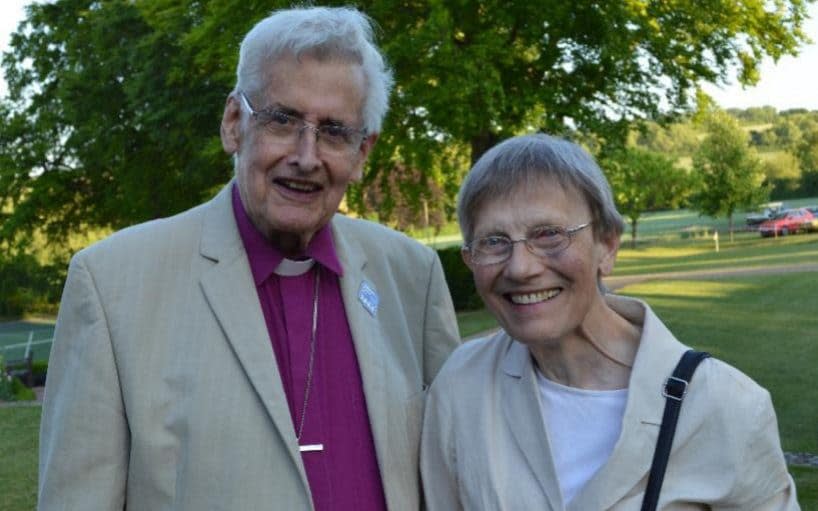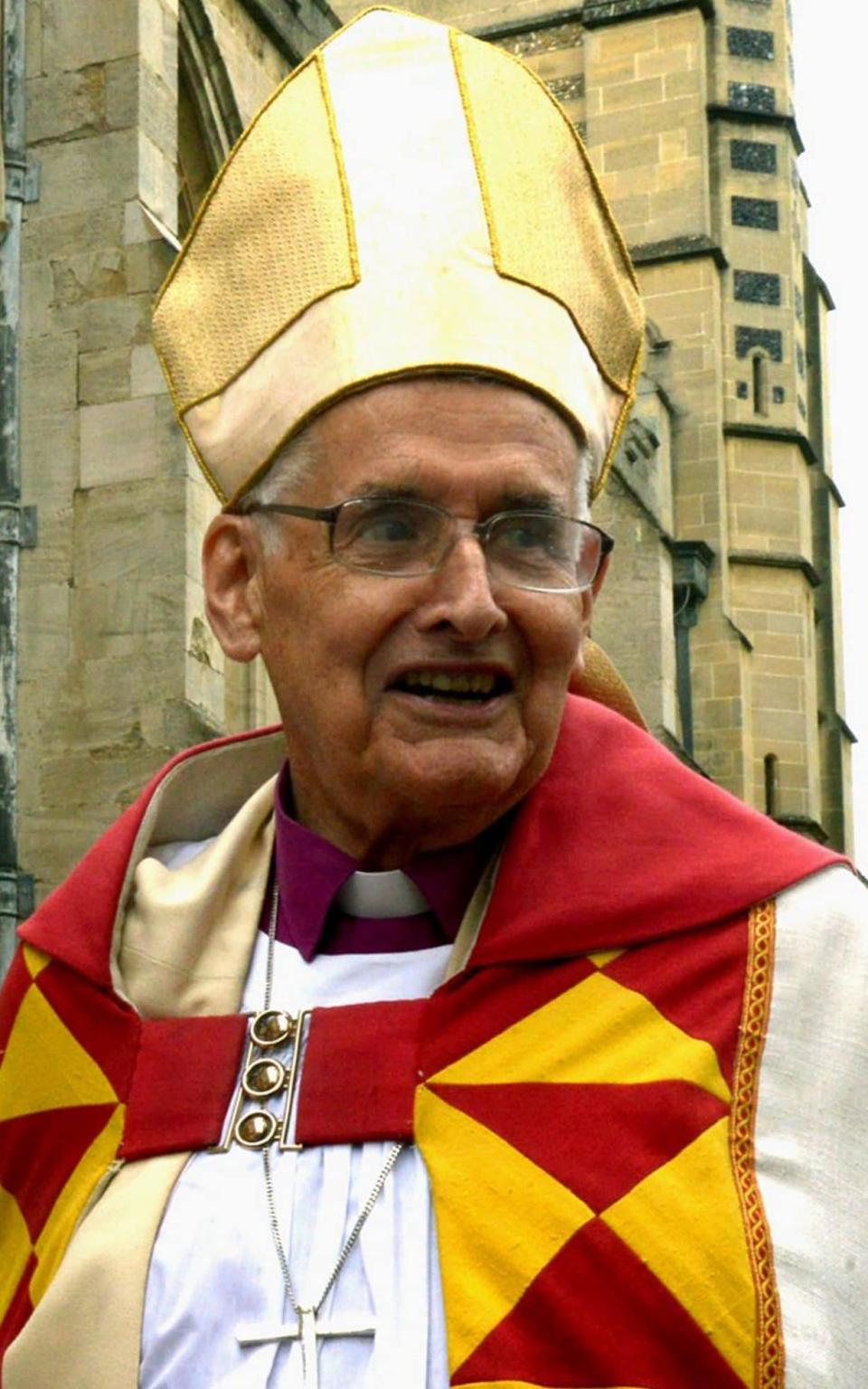The Right Reverend John Dennis, popular Bishop of St Edmundsbury and Ipswich – obituary

The Rt Rev John Dennis, who has died aged 88, was Bishop of St Edmundsbury and Ipswich from 1986 until 1996, having previously been the suffragan bishop of Knaresborough in the diocese of Ripon.
He was a keen cyclist, and took a folding bicycle on the train when travelling to meetings in London. When he was translated to St Edmundsbury and Ipswich in 1986 he arrived at his cathedral for his installation having cycled around the perimeter of his new diocese.
The marathon ride along the borders of Suffolk included visits to 160 churches; it was his way of marking the 75th anniversary of the founding of the diocese by “travelling round the edge and enfolding the whole of it in a loving embrace”.
He was also a keen and quick motorist, priding himself on having obtained an advanced driving certificate. Residing as he did in Ipswich, it is said that he could cover the 30-mile cross-country journey to his cathedral in Bury St Edmunds in 40 minutes.
Dennis was regarded in his diocese with much affection, not least for his sense of humour – which was inherited by his younger son, the actor and comedian, Hugh Dennis. His sermons were seldom scripted and were always seemingly spontaneous; his wife used to say that she had no idea what he was going to preach about – and she sometimes wondered whether he did either.
But he was highly industrious, and when he collapsed towards the end of his ministry in Suffolk, he along with others thought it was because he had tired himself out. In fact it transpired that he had developed a dangerous form of cancer, which was cured by the removal of a significant length of intestine.
John Dennis was born on June 19 1931 in south-west London, where his parents lived in the new development of Burton Park. His father, Ronald, a former platoon commander on the Western Front, taught science at Rutlish School, Merton, where Dennis himself was educated. His mother, Evelyn, was the daughter of LJ Neville-Boley, who wrote a biography of the scientist John Dalton.
When he was aged nine, just at the start of the Blitz, Dennis contracted typhoid. This caused consternation among the local authorities, who feared the outbreak of an epidemic. But his proved to be the only case, and after a spell in isolation hospital he was sent away from the bombing to live with his grandparents in Yorkshire.
Unlike his parents they attended church regularly and took young John with them. But it was only after returning home and attending a VE-Day thanksgiving service that Dennis began to sense the dawn of his Christian faith.
This was reinforced by confirmation classes, which led him in turn to feel a vocation to Holy Orders. On leaving Rutlish School, Merton, Dennis undertook National Service as a pilot officer in the RAF before going up to read theology at St Catharine’s College, Cambridge. He then trained at Cuddesdon Theological College before his ordination in 1956 to a curacy in Armley, Leeds.
Following a second curacy, at Kettering, Dennis was appointed Vicar of the Isle of Dogs in the East End of London, where for nine years he led a sizeable ministry team.
In 1971 he was appointed incumbent of John Keble Church, Mill Hill, in North London. His forward-thinking but absent-minded predecessor, John Ginever, had prepared the way by accidentally setting fire to the sanctuary – enabling it to be re-ordered in more contemporary fashion.

For much of his time in Mill Hill, Dennis was also Area Dean of West Barnet. He was made a prebendary (honorary canon) of St. Paul’s Cathedral in 1977.
Dennis was consecrated Bishop of Knaresborough in 1979 (it is rumoured that he put his new episcopal shirts in the washing machine with the family laundry, all of which emerged in a rather fetching shade of purple). In addition he was Director of Ordinands for the diocese of Ripon.
He was keen to explore the potential of Ordained Local Ministry, wherein men and women are specifically trained, ordained and authorised to serve solely in the parishes whence they were called. The concept is not without its difficulties, not least regarding the status, for example, of a person’s priesthood when he or she steps outside or moves away from their original locality, and the model has met with varying degrees of success.
It was during his episcopate in Yorkshire that Dennis was asked to chair a working party of the General Synod to explore the principles and potential practice of admitting baptised children to Holy Communion before they were confirmed.
The possibility had been examined before: a commission under the chairmanship of the then Bishop of Ely had concluded in 1971 that baptism signifies complete initiation into the Christian family and that children could be admitted to communion before confirmation on that basis.
In 1976 the Synod decided instead to keep the status quo, but the vote was close enough to motivate further discussion. The resulting “Knaresborough Report”, published in 1985, recommended that regulations for admitting all baptised people to communion should be drawn up and approved.
With characteristic caution, Synod proceeded formally “to take note” of the report. As Dennis lamented, it then lay on the shelf for the best part of a dozen years before its recommendations were followed up by the House of Bishops and guidelines approved by the Synod in 1997.
Upon retirement from Suffolk, Dennis went to live first in Cambridge, and then in Winchester, where he served as an honorary assistant bishop and, as he put it, “episcopal curate” in the parish of Weeke. Generously hospitable, he also exercised a valued ministry as a spiritual director and counsellor.
He continued to derive much inspiration from his membership of the Franciscan Third Order, of which he was Chaplain from 1988 to 1994; and he relished having time to enjoy his family and indulge his hobby of wood-turning.
Dennis met his wife, Dorothy, at a lecture in Cambridge. They married in 1956, during the first year of his curacy at Armley, and had two sons: John, a diplomat and recently Ambassador to Angola; and Peter, better known as the comedian Hugh Dennis. His sons survive him, but his wife predeceased him earlier this year.
Rt Rev John Dennis, born June 19 1931, died April 13 2020


